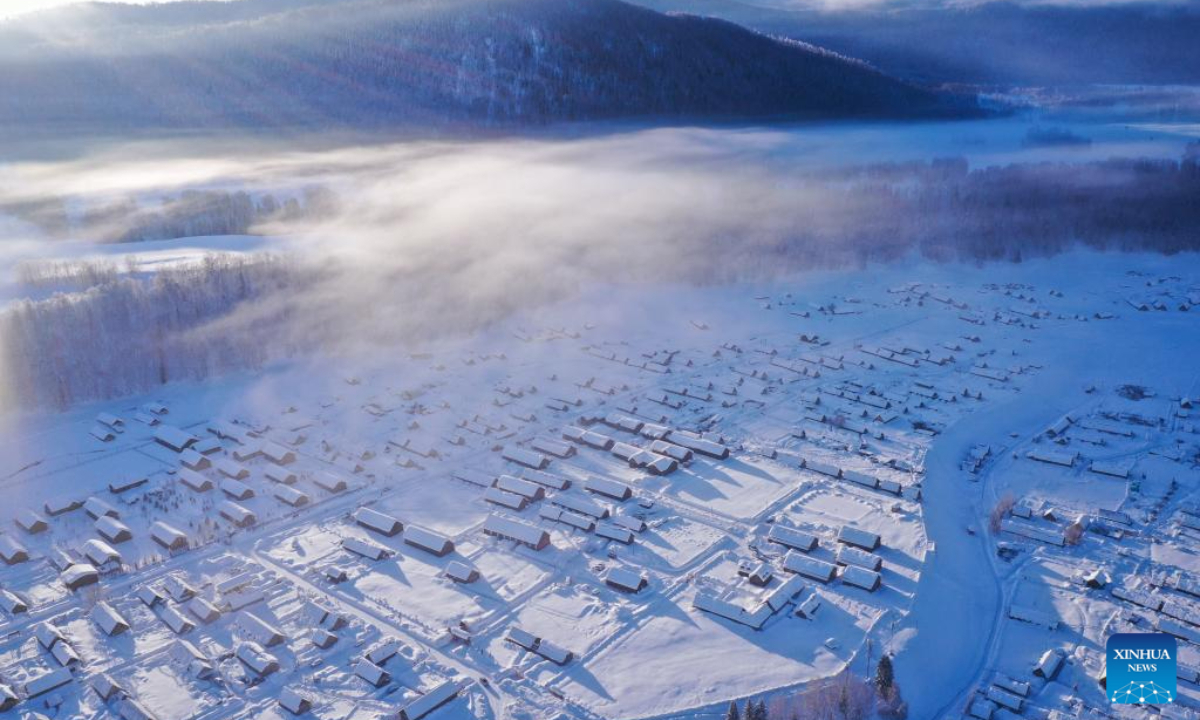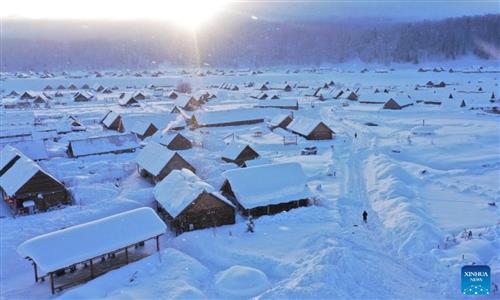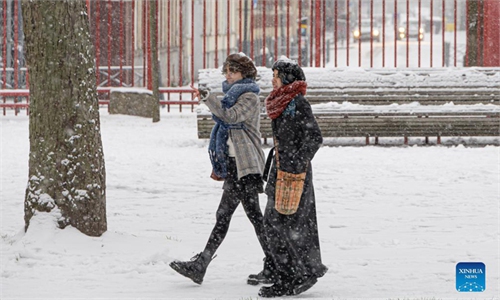
An aerial drone photo taken on Jan 17, 2024 shows a view of Hemu Village after snow in Altay Prefecture, northwest China's Xinjiang Uygur Autonomous Region. Photo:Xinhua
China is experiencing the first cold wave of 2024, as the central and eastern regions of the country face a severe drop in temperatures, while many southern areas will be hit by heavy snowstorms, according to China's meteorological authorities. Multiple provinces and cities are implementing various measures to deal with the cold weather.
The National Meteorological Center (NMC) issued a yellow alert for cold wave on Sunday morning, noting that temperatures in many regions are expected to drop by 8 to 10 C from Sunday to Tuesday, with some areas including Jilin, Liaoning, and Shanxi provinces experiencing a temperature drop of up to 12 to 16 C. As the cold air moves south, Guangxi and Guangdong provinces will see temperatures falling below zero by Tuesday.
The NMC also issued a yellow alert for snowstorms, stating that heavy snowfall is expected in multiple provinces by Monday afternoon, with localized areas in Guizhou and Hunan experiencing heavy blizzards reaching 20 to 23 millimeters. The aforementioned areas will see an additional snow depth of 3 to 8 centimeters, with some areas exceeding 10 centimeters, and freezing rain is expected in Guizhou, Hunan, and Guangxi provinces.
Additionally, a blue alert for wind was issued, and some areas including the Liaodong Peninsula and Shandong will experience strong winds and gusts, which will last until Monday.
The NMC reminded the public to keep warm and pay special attention to the elderly, while relevant departments should strengthen road, railway, and power line inspections and maintenance, and clear snow in time.
High-altitude and water-based outdoor operations and recreational activities are being suspended, the meteorological authority said, noting that fences, billboards, and temporary facilities that are prone to being blown away by strong winds should be reinforced or properly relocated.
The Ministry of Emergency Management (MEM) initiated a level-four emergency response in Hunan and Guizhou provinces on Sunday, and in addition to the workgroup previously dispatched to Hunan, an additional workgroup was sent to Guizhou to assist and guide the prevention and response efforts for the cold wave.
Facing the cold weather, provinces and cities in China have taken various measures to ensure the safety of the masses.
As gusts of wind hit Zhoushan, East China's Zhejiang Province, as of 2 pm on Saturday, 46 water routes have been suspended.
The local government has conducted onshore and offshore cruise inspections, issued collision prevention warnings and reminders for return of fishing boats, and coordinated the early deployment of passenger evacuation work for key tourist water passenger routes. As of media report on Saturday, about 8,000 tourists have been evacuated from the Putuo Mountain scenic area.
Some toll stations on highways in Central China's Hubei Province implemented traffic restrictions around 5 pm on Friday, with the traffic management department initiating emergency plans to strengthen road patrols and deploy snow-melting agents in coordination with highway maintenance department. As of 10 am on Saturday, several controlled sections of the highway have resumed traffic.
Similar measures have been taken in North China's Shanxi Province, where the cold wave has led to the accumulation of snow and ice formations on sections of some highways. In order to ensure the safety of drivers and passengers, the traffic police department has implemented temporary closures or restrictions on the entry of vehicles with more than seven seats and hazardous chemicals into the highways.
East China's Jiangxi Province on Saturday initiated a level four emergency response to deal with the first cold wave weather of the year, trying to prevent adverse effects of snow and freezing on facilities such as power and communication lines.
The public are reminded to guard against cold, respiratory infections, cardiovascular and cerebrovascular diseases, and pay attention to the safety of electricity, fire, and gas usage. It is also necessary to strengthen the protection of crops against freezing, reinforce snow removal in agricultural greenhouses, and promptly harvest mature vegetables and fruits, the local government noted.
Global Times



